#fantasy historical analysis
Explore tagged Tumblr posts
Text
New Fic
It's been a while since I've written, so I got my fancy writing tools out and decided to write! Turned out to be a story set in my original D&D/TTRPG world named Aetherius, set in the port town of Drakenkirk concerning political corruption and standing up to power! It's even capped with a little (fantasy) historical analysis :)
I hope to get back to some of my WIPs in the near future, but I hope y'all enjoy this!
#ao3#ao3 link#archive of our own#D&D#dungeons and dragons#aetherius#writing#fantasy writing#creative writing#short story#fantasy historical analysis
11 notes
·
View notes
Note
Please tell me more about neighbourhood PMCs in renaissance Italy
It would be my pleasure! (My research into this owes a lot to the excellent Power and Imagination: City-States in Renaissance Italy by Lauro Martines.)
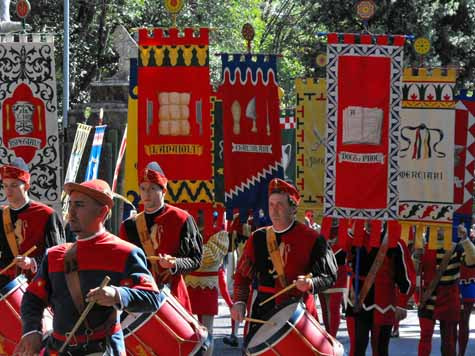
The first thing to note that, unlike the condottieri, these were not private military companies. Rather, the neighborhood military companies (in the sense of a military unit, rather than a profit-making entity) were self-defense organizations formed as part of a centuries-long political struggle for control over the urban commune between the signorile (the urban chivalry)/nobilita (the urban nobility) and the populo (the guilded middle class, who claimed to speak on behalf of "the people").
This conflict followed much the same logic that had given rise to the medieval commune in the first place. Legally, the communes had started as mutual defense pacts between the signorile and the cives (the free citizens of the city) against the rural feudal nobility, which had given these groups the military and political muscle to push out the marquises and viscounts and barons and claim exclusive authority over the tax system, the judicial system, and the military.
So it made sense that, once they had vanquished their enemies and established the commune as the sovereign, both sides would use the same tactic in their struggle over which of them would rule the commune that ruled the city. The signorile and nobilita formed themselves into consorteria or "tower societies," by which ancient families allied with one another (complete with dynastic marriage alliances!) to build and garrison the towers with the knights, squires, men-at-arms, and bravi of their households. These phallic castle substitutes were incredibly formidable within the context of urban warfare, as relatively small numbers of men with crossbows could rain down hell on besiegers from the upper windows and bridges between towers, even as the poor bastards on the ground tried to force the heavy doors down below.
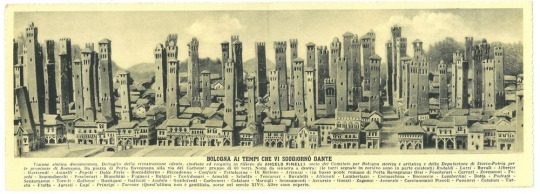
To combat noble domination of communal government, achieve direct representation on the political councils, establish equity of taxation and regulate interest rates, and enforce legal equality between nobility and citizenry, the populo formed themselves into guilds to build alliances between merchants and artisans in the same industries. However, these amateur soldiers struggled to fight on even footing with fully-trained and well-equipped professional soldiers, and the guild militias were frequently defeated.
To solve their military dilemma, the populo engaged in political coalition-building with the oldest units of the urban commune: the neighborhoods. When the cities of medieval Italy were originally founded, they had been rather decentralized transplantations of the rural villages, where before people had any conception of a city-wide collective their primary allegiance was to their neighborhood. As can still be seen in the Palio di Siena to this day, these contrade built a strong identity based on local street gangs, the parish church, their traditional heraldry, and their traditional rivalries with the stronzi in the next contrade over. And whether they were maggiori, minori, or unguilded laborers, everyone in the city was a member of their contrade.
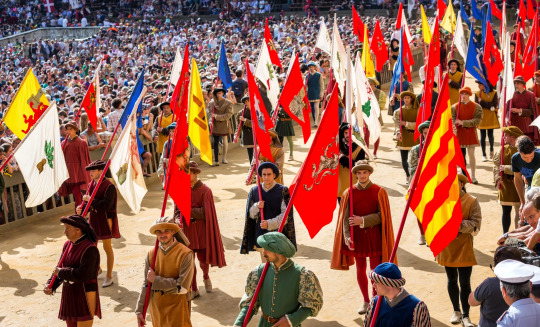
As Martines describes, the populo both recruited from (and borrowed the traditions of) the contrade to form their armed neighborhood companies into a force that would have the manpower, the discipline, and the morale to take on the consorteria:
"Every company had its distinctive banner and every house in the city was administratively under the sign of a company. A dragon, a whip, a serpent, a bull, a bounding horse, a lion, a ladder: these, in different colors and on contrasting fields, were some of the leitmotifs of the twenty different banners. They were emblazoned on individual shields and helmets. Rigorous regulations required guildsmen to keep their arms near at hand, above all in troubled times. The call to arms for the twenty companies was the ringing of a special bell, posted near the main public square. A standard-bearer, flanked by four lieutenants, was in command of each company."
To knit these companies organized by neighborhood into a single cohesive force, the lawyers' guilds within the populo created a state within a state, complete with written constitutions, guild charters, legal codes, legislative and executive councils. Under these constitutions, the populo's councils would elect a capitano del popolo, a professional soldier from outside the city who would serve as a politically-neutral commander, with a direct chain of command over the gonfaloniere and lieutenants of the neighborhood companies, to lead the populo against their noble would-be overlords.
And in commune after commune, the neighborhood companies made war against the consorteria, taking the towers one by one and turning them into fortresses of the populo. The victorious guilds turned their newly-won military might into political hegemony over the commune, stripping the nobilita of their power and privilege and forcing them either into submission or exile. Then they directed their veteran neighborhood companies outward to seize control of the rural hinterland from the feudal aristocracy, until the city had become city-state.
(Ironically, in the process, the populo gave birth to the condottieri, as the nobility who had lost their landed wealth and political power took their one remaining asset - their military training and equipment - and became professional mercenaries. But that's a story for another time...)
#history#historical analysis#renaissance history#renaissance fantasy#medieval cities#city-states#urban communes#guilds#city charters#guild charters#mercenaries#nobility#artisans#burgher rights#merchants
146 notes
·
View notes
Note
i’m not sure if you’ve already done something similar but i was wondering if you had any hc for regina’s relationship with clothes? i just feel like there’s so much to dig into with all her mother’s bullshit and how she was raised to value appearances, how performative a lot of her outfits were as the evil queen, the shift in how she dresses after the curse breaks, her and emma’s opposite approaches to how they dress themselves. idk i just feel like if anybody else would also have thoughts on this, it would be you
anon i am literally in love with you for sending me this ask. honestly why have i never done a post on this before!!! this is SO interesting to me!! clothing is definitely a hugely important part of regina's character and journey over the course of the show.
PSA: this turned into a literal play by play biography of regina's life through clothing. ur welcome. also this is totally unedited, we die like men
I think clothing means a lot of different things to Regina. I think she both revels in and resents the glitz and glamour, uses it as her shield, weaponry and armour but also it can be very vulnerable for her... it's a lot
and I agree that, unfortunately like many things with Regina, we have to start by tracking back to her childhood and how Cora raised her
Regina is a young noblewoman in the enchanted forest, and much of her 'value' to her family would lie in making an advantageous marriage. Layer on top of that Cora's absolute single minded determination for success, social climbing and for Regina to become queen one day and you just KNOW appearances were a huge deal when Regina was growing up (we see this threaded through canon too, in Cora magically changing Regina's clothes/hair/makeup for her)
to Cora, Regina's beauty was always a valuable tool she could use, but her brutal ambition would have led to absolute perfectionism.
After all, sweetheart, queens have to be perfect.
I think even when Regina was a very young child, a huge amount of weight was put onto her clothing and how she was presented.
I can imagine Cora choosing elaborate outfits for her infant daughter, dressing her up like a doll and making sure the ribbons in her hair matched exactly, being absolutely critical of everything to ensure her child was the best dressed, the most perfect
And I think this hugely impacted Regina's childhood. Cora would have allowed Regina very little freedom, partially because she was conditioning her to behave like a queen (or just like an obedient pawn for her to do whatever she wanted with) but also partially because Regina literally could not risk getting messy or dirty.
Image is everything, darling.
As child, Regina couldn't really play because she would ruin her dress, or her hair, or scuff her shoes. She had no choice but to occupy herself with the 'proper' pursuits that her mother approved of, because she physically couldn't do anything else. No running, tree climbing, flower picking etc for tiny Regina. Lots of sitting quietly and looking pretty, even as a child.
I can definitely see Cora showing Regina off from an early age, dressing her up like a doll, inviting other noblewomen for tea and dressing Regina better than any of their children, making her sit nicely and quietly.
If Regina were to be 'bad' and accidently dirty her dresses, mess up her hair etc. I think Cora would definitely punish her quite severely. because from day one, Cora was drilling into Regina that her appearance was one of the most valuable and worthwhile things about her. Queens have to be perfect.
And of course, little Regina doesn't want to be a queen, she just wants to go play in the meadow with the other children, but she wants to be a good girl more than anything, because mother hurts her when she's not.
As Regina grows older, I think Cora becomes far more critical of her appearance. A doll like, cute child is far easier to keep 'perfect' than an adolescent girl, and it's also all a huge control tactic for Cora to keep Regina affection starved and desperate to please her. So there would be backhanded comments, the constant pressure to be more beautiful. The feeling started to grow in Regina that she was pretty, just not pretty enough, never enough.
Ik I've talked about this before here (TW for EDs) but I headcanon Cora as absolutely fucking up a young Regina's body image and relationship with food too, controlling/restricting her diet. So I can imagine that dress fittings became a source of enormous stress and pain for an adolescent and teenage Regina.
In the enchanted forest, as a noble, all of Regina's clothes were likely hand made from expensive fabrics. Cora would spare no expense for making her daughter the most fashionable, beautiful, ideal young lady. So there was enormous pressure on Regina to 'wear the clothes well' and to keep them pristine. But these fittings would have been hell, because Cora definitely was stood in the corner, never ever asking Regina's opinions or how she feels in the clothes, but only ever criticizing the fit, asking if her corset could be laced tighter, and despairing over tiny mistakes.
Despite all this though, I do think a young Regina enjoyed clothing and fashion in a way. As much as her mother made it absolute hell, Regina really did like the few dresses she was allowed to have a say in and I think she always liked pretty things, she just wished she was allowed to like them on her own terms.
I think the white dress we see her wearing in a lot of her early EF flashbacks was one of her favourites because it's pretty but also simple and comfortable, something she would have chosen herself and just luckily happened to be considered suitable by her mother.
I've written about it in this fic but I also think Cora would have been actively sexualising Regina from a young age, trying to make her as appealing to suitors and other noblemen as possible to get more power and advantage. This would make Regina very uncomfortable, and I think at this point she really resented all this elaborate clothing and heavy jewelry.
There's also something really interesting in canon ouat costume design I want to discuss because I've never seen it discussed before: in 2x015 The Queen Is Dead, we get a glimpse of the fashions in Leopold's kingdom around the time Regina and Snow were about to meet for the first time. We see Queen Eva, clearly an empowered adult woman, wearing a tightly fitting deep red dress covered in jewels. Meanwhile the ten (ish?) year old Snow White wears a more appropriately girlish frock with puffy sleeves, a simple bodice and full skirts. Around this time, we mostly see Regina dressed in the latter style, implying she is still being dressed and presented more as a young lady/maiden than an adult. The blue dress Cora puts her in to meet King Leopold is a very similar design to Snow's, with full sleeves and skirt; her riding coats are also loose and puffy sleveed; the dress she wears at dinner when married to Leopold is full sleeved and skirted too; the white dress we see her in several times is the exception, but looser still than Eva's style.
I believe the earliest we see Regina in that adult style dress is in Fruit of the Poisonous Tree, when she's years into her marriage and about to kill her husband and seize power. This is a moment of empowerment for her shown through costume, and a clear shift she's gone from girl to woman, which is actually disgusting considering this is at the end of her marriage to the elderly king.
My point here is that I think throughout her marriage the world still saw Regina as a child to a degree, a poor replacement for Eva, and Regina was still very much a young woman, who did not feel any older or freer. Her marriage kept her trapped and unempowered, just like her mother had.
She always had to be beautiful and perfect, and this pressure was amped up even more as queen. I can see a newly married Regina trying so hard in the first few years to always be perfect, constructing elaborate outfits, hair and makeup just like Cora taught her, to try and be good enough for Leopold, to make him more kind to her, to make anyone at court notice her at all, but it never works. She is still only ever objectified or sidelined or both.
When she begins training with Rumple, we start to see Regina developing a new sense of style: she begins wearing darker colours, to mimic her mentor in a way. I think this is very indicative of her mental state, how easily influenced she was, how much she wanted to latch onto this one source of potential hope and power in her life.
But this was of course a transitional period, and I do think it's interesting that we see her in 1x11, seducing Sidney and killing her husband finally wearing one of the long, tight, elegant 'adult' dresses Eva wore as queen. This is when Regina really steps into her own power.
Once again to refer briefly to the same fic I think in the few years leading up to this (remember, as I love to remind everyone, her entire horrific marriage was probably around 8 years at least), Regina began to learn more of her seduction politics, and started to understand how she could manipulate the way men behaved towards her. She started to fully understand what her mother meant, how to choose a dress for the right situation, how to choose a neckline, a lipstick shade, a way of walking and talking.
I think this took her a while to stop feeling disgusted by. At some point, the rush of even this tiny way of grabbing power was exhilarating, long overdue. At some point, that stopped making her skin crawl.
Starting to wear darker colours was I think a way of rebelling against her past self. I really think throughout her reign as the 'evil queen', Regina had to loathe her younger, innocent self because that was the version of her that got hurt, used, raped, manipulated, brokenhearted. It was easier to hate that version of herself, to blame herself for being weak and stupid (Mother's voice in her head, always) than to fully feel the pain she was still in. So the pastels and whites of her youth were completely gone. She buried them, and the girl who loved them, as far as she could.
It also seems like pastels were commonplace in the Enchanted Forest based on every extra in every ballroom scene ever, and at this point Regina was so reliant on her attractiveness as a form of power that wearing dark colours and deep jewel tones was a way to ensure she always stood out, always caught the eye.
As her reign grew, I think the Evil Queen costumes grew more and more extravagant as a show of wealth and power to dazzle the commoners and intimidate all the nobles. Regina was showing them with her style choices that she was in a league of her own. And the more she leaned into it, the glitz and glamour, all the diamonds and makeup, the things she hated as a young girl, the safer she feels. The more hidden. The more superhuman.
The Evil Queen was a physical symbol as well as an idea of who Regina was. I think of it almost like how celebrities have public persona, sexualised and stylised, instantly recognisable and fastidiously designed. I think this made Regina, a physically small woman, much smaller than all the other older, male leaders and rulers, feel protected, confident and powerful.
(I think it's also a defense against the fact that as a very young girl Regina was sexualised by her own mother for a much older man, for his whole court I suppose. Regina has always been taught, through her mother's words and actions, that her beauty and attractiveness correlate to her worth, power and usefulness. And now she sort of enacts that on herself to keep herself safe. Because they can't sexualise her if she's sexualised herself first, they can't be using her if she's letting them and using their lust for her to her own ends. Her beauty keeps her safe. Queens have to be perfect, Regina.)
When we get to Storybrooke, I think it translates somewhat. In this world, political figures are the power symbols, and unfortunately in this world too, female politicians are more successful if they are polished and beautiful. Or so Regina would see it.
Queens have to be perfect, sweetheart.
She upkeeps the Evil Queen thing where she has a recognisable image, this polished perfect professional thing. Though this world is on a much smaller scale, Regina's mindset is not at all. She would never be seen out of the house without a perfect face of makeup, without perfectly done hair, manicured nails, the right outfit, the right shoes. Because queens have to be perfect. You can't show them a single crack in your armour.
It isn't all a chore though. I think Regina really does enjoy her own style, especially in Storybrooke as it is so different to anything Cora or Leopold would have had her wearing, and because it's part of a world she made for herself, there's more of a sense of independence and ownership of her own style. I think she has a really nice sense of routine in doing her makeup and hair, which is good for her too.
But still in Storybrooke, we see Regina using her attractiveness, using seduction as a often reached for tool in her arsenal.
And on the other hand we have Emma.
Now, this is a Regina post but the ask did specify and I do find it interesting and want to discuss, so I'll give a much briefer overview of my headcanons about Emma and her style.
Off the bat I'll say I consider 'Emma's style' as season 1 and 2 Emma. (I'm not going to analyse the straight-girl-style-ification of Emma Swan in the later seasons bc that's another story and also just Bad storytelling imo)
Skinny jeans, boots, tanks, plaid, leather jackets, beanies, baseball shirts. She's mostly casual, can be a bit edgy, a bit lesbian swagger, a bit teenage boy (at times). Sometimes she does a winged liner, sometimes nothing. And she dresses with nothing else in mind but what makes her feel confident and cool and herself.
Because Emma as a kid never really had the freedom to pick her own clothes. The homes got a lot of donations, and sometimes there were cool things she could grab a hold of if she managed to beat the older kids to it, but a lot of the time she was just in whatever hand me downs she could get. Not ideal for a young queer girl trying to work out her identity.
So when she started to establish a life for herself, the first time she buys her red leather jacket etc, these moments are really meaningful to Emma because it's more about being able to own her sense of self and stand on her own two feet in a stable way rather than just being about the clothes.
Which is so beautiful, because it just goes to show that once again Regina and Emma are complimentary opposites. Clothes were never important in Emma's life, so when she gets the chance, she just likes being able to wear whatever the fuck she wants, to never really worry about it, and to feel good. To Regina, clothes were always enormously important and so a great deal of thought and preparation goes into everything she wears.
I think it is interesting the way they interact in this case, because they are so different, and they both find the other one so hot, and I think they also both admire how different it is for the other.
Regina in denial would definitely consider Emma's casualness to be improper and lazy, but deep down, and eventually openly once they grow closer, she knows she admires her freedom and fearlessness.
Meanwhile Emma thinks Regina is the hottest woman on the planet (she's right) and appreciates how perfectly her gf puts outfits together, how good her makeup and skincare collection is.
But Emma can also see the other side of it for Regina too, is one of the few people (perhaps because of her own history with clothes) who can see the strain there. The control and obsession with her own appearance, the perfectionism.
And I think Emma is really good for her in that sense. Emma's own freedom and confidence is a good influence. Because gradually, as they get together and their relationship develops, Regina is able to let down a little more of that mask, bit by bit.
Letting Emma see her with wet hair, her natural curls straight out of the shower. Or in her robe with no makeup on in the mornings. And as they build their life together, Regina finds this immense relief in having someone who sees all of her in every state.
It's not as scary as it once seemed.
And Emma thinks Regina is just as beautiful in leggings and fresh faced as she is with makeup and an expensive dress. (Once again, she is right). This is groundbreaking to Regina, this idea that she can be loved and valued without upkeeping her definition of 'perfection'. That she could be enough as she is, for Emma.
That she is enough, as she is.
And of course, she doesn't always believe that. How can she, after the life she has lived? But she's working on it, and when these feelings of immense vulnerability and insecurity in herself arise, she is able to voice them to Emma (sometimes with a bit of struggle) and Emma holds space for her, listens without judgement, calls Cora a dumb bitch (sometimes) and assures Regina that she is the most beautiful person Emma's ever seen, but that her beauty is not why she fell in love with her, and it's not what makes her worthy.
And slowly, I think Regina starts to get back to finding more joy in fashion. More appreciation, in the way her younger self always wanted.
#i fucking love analysing costumes in media#and i fucking love historical/fantasy fashion#AND i fucking love analysing regina mills#this is the best post ever#christmas came early for miss salad#regina mills meta#regina mills analysis#ouat analysis#regina mills headcanons#regina mills#swan queen#sq#swan mills family#swan queen headcanons#emma swan#fuck king leopold#tw cora#tw leopold#cora mills
106 notes
·
View notes
Text
I know multiple of these are likely important to people, but I'm asking in terms of like - which of these do you tend to focus on the MOST, enjoy the most, that is most essential for you to actually care about the media, etc.?
(For example: someone finding "Relatability" most important would likely not enjoy a show much if they have trouble empathizing with the characters/relating to it, even if it were good otherwise. Or, someone might be able to overlook bad acting and ugly costumes, as long as the Character Dynamics are fun to them, because they value that more than Aesthetics- while for others, bad costumes would be a dealbreaker.)
Also feel free to reblog and explain your answer or more information in the tags- I've always been curious about people's relationships to media, how they conceptualize it/what they get out of it, how some people value some parts more than others, how that informs their overall taste and genres they may be more inclined towards, etc. :0c
#I was having a conversation with a friend about our favorite type of media and they said the reason they DON'T like historical or fantasy#media or etc. is because they can't imagine themselves being in those situations like it's too detached from anything that they can relate#to personally. they put themselves in the shoes of the characters and apparently like feel emotions while watching stuff and actually#get into the way the characters are feeling so they kind of judge how 'good' or 'bad' a show's writing/setting/etc. are by how it makes#them feel and if they think the characters reacted realistically based on what they were feeling in the moment/what in their head they#would be feeling if they were in the postion of the character. SO apparently the distance of it being in an unrelatable setting or too#detached from our reality makes it harder for them to relate to and less able to really engage with it on that level. WHEREAS I watch#things exclusively in a very like.. detached way?? I'm INTERESTED.. it's like im intellectually analyzing everyhting that's happening and#can be intrigued by events but it's not in an emotional way? More of like a distant 'intellectual curiosity'. Maybe the premise or the#aesthetics or something about it has piqued an interest for me to observe it. to see what it's like or how it plays out. how the idea#is executed or etc. But like.. I cannot remember EVER really relating to any character or situation or projecting onto a character#or having those sorts of feelings or investment in it. That is just not a central part of why/how I watch things or what I care about#BUT after this I was thinking maybe this is my disconnect? I do not seem to conceptualize media the way some other people do and I often#walk away with an entirely different take on things. etc. So I wonder if maybe it's part of how everyone values different things probably?#maybe I literally just watch stuff and percieve it from a different frame of mind that others. More of a like detached curiosity#vaguely bemused analysis mode. Instead of a 'I am deeply emotionally invested in this and am feeling for all the characters' mode#And also I bet people who care more about plot/story are also the people who mind spoilers. Whereas for me I literally seek out spoilers#intentionally because that element of 'suprise ooh what will happen next!' is not central at all to my enjoyment. I could know literally#everything that will happen and still can find it interesting to observe - since for me#that's not the point. I'd rather know the ending so I can determine whether I want to invest the time in it in the first place. etc.#ANYWAY!! If I had to choose - I would say I'm usually heavily focused on world details and aesthetics. With only a slight preference#towards characters individually being interesting. Group dynamics can sometimes be okay but I get tired of everything being about relations#hips and romance - especially when sometimes it seems to be like. people who could not stand on their own as a character/are fundamentally#boring otherwise lol. I would watch a series of just one guy locked in a closet talking to himself as long as he was interesting and saying#things that were amusing or notable for some reason lol. I actually tend to dislike plot because most 'plot heavy' things like action focus#ed shows ALWAYS feel to me like they're moving so fast just to get from one thing to another that I'm not getting enough details. Part of#why I tend to not like movies. the time limit makes them too quick. I need a 95 hour expostion dump of the history of the entire world#and a series of 17 episodes straight where a guy is trapped in a room & the audience is just psychoanalyzing him. hghj.. Maybe I find all#characters annoying/unrelatable bc people w my personality type make bad characters/are not often represented (or are done BADLY). so then#I'm just picking 'who is the LEAST insufferable? who could i study like a lab rat?' whilst my main focus is the worldbuilding&costumes lol
76 notes
·
View notes
Text
Not CSM related, but the fucked up realization I had after I reread early « What It Means to be You » manhwa chapters is that every nobles who had encounter with Winter is either racist or super greedy. No wonder he's so angry when Violet accidentally call him a slur, an "outsider".
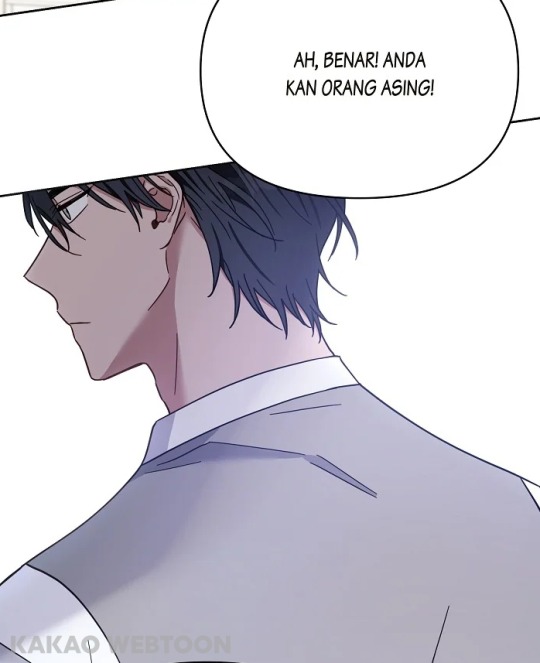
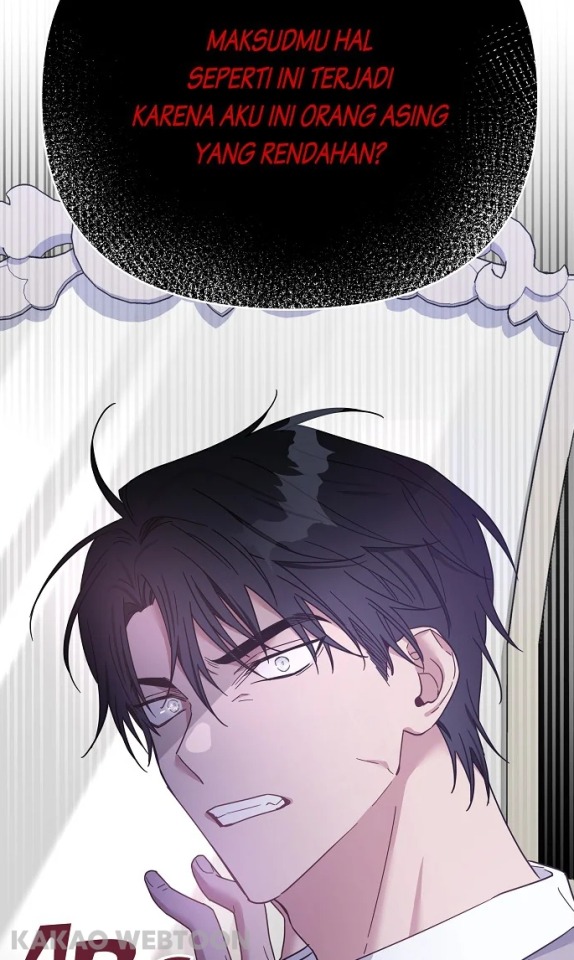
I think this is another thing than family abuse that most manhwa readers often forgot when talking about his characterization and his motives. Why he has inferior complex. Why he thinks everyone must hate him. Why he is so materialistic.
I'm talking about "Internalized racism."
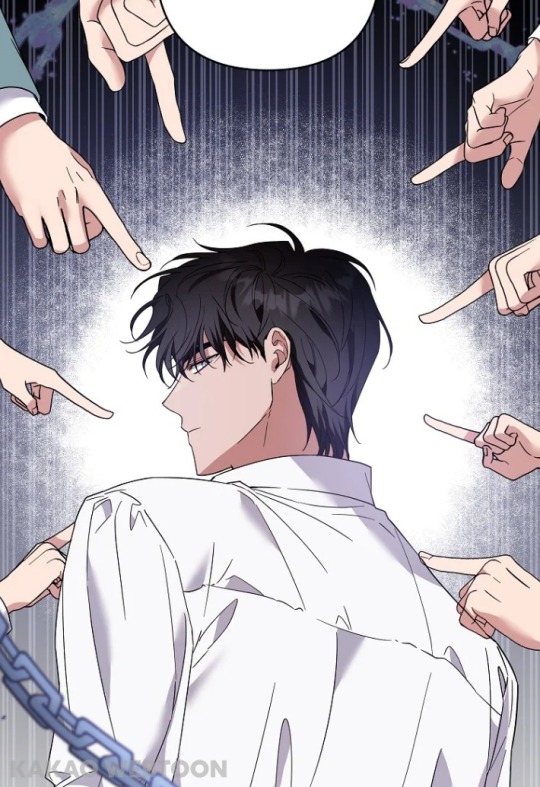
And it's NOT even subtext, this narratives is a SLAP on the face. But even after that, I never found any other fellow readers talked about this.
Let's be real here. The first thing the Margrave family thought to get a business deal with him is not to do an actual meeting but using millitary forces. The old nobles are legit willing to do brutality just because they see him lesser than them. If not because of their son stopping them, they will absolutely fkin did that.
Even Violet's NICEST friends are subtly racist towards Winter.... They got called out by Winter HIMSELF, but no one bat an eye. No one read it this way, right?
This racism is systematical. It passed through older generation to the young. Even though it seems to be tamer than the old days, it's still there. The generational traumas, the stereotypes, "the uneasiness" are still there.
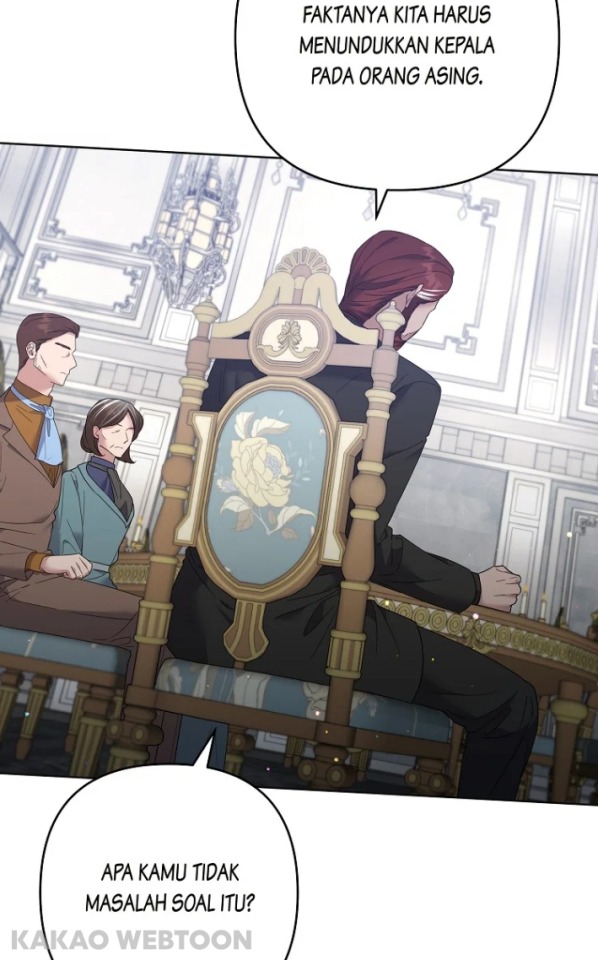
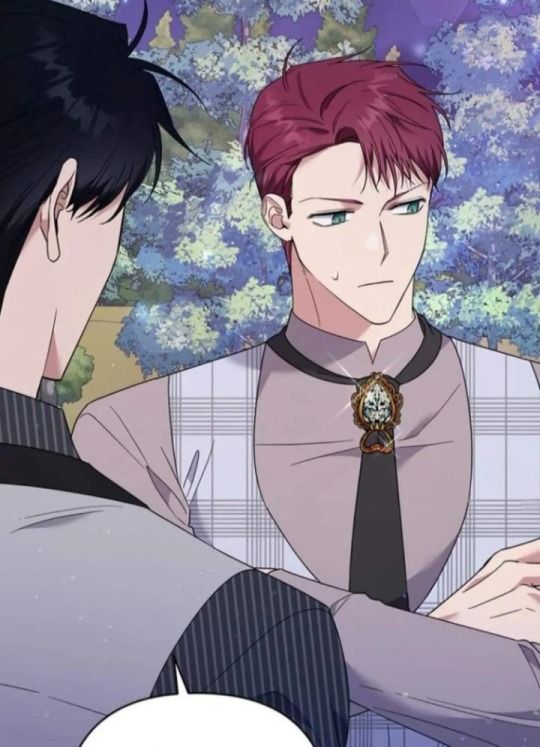
Real sad hours to think Winter outwardly admit that he don't want to have kids who would looks like him (silver eyes, etc) with Violet in the early WIMTBY days because he don't want his kids to experience the same racial traumas as him. To the point he prefer Violet to have kids with another man. This is another level of pain and I'm sfwhskawlalsl 😭😭😭.
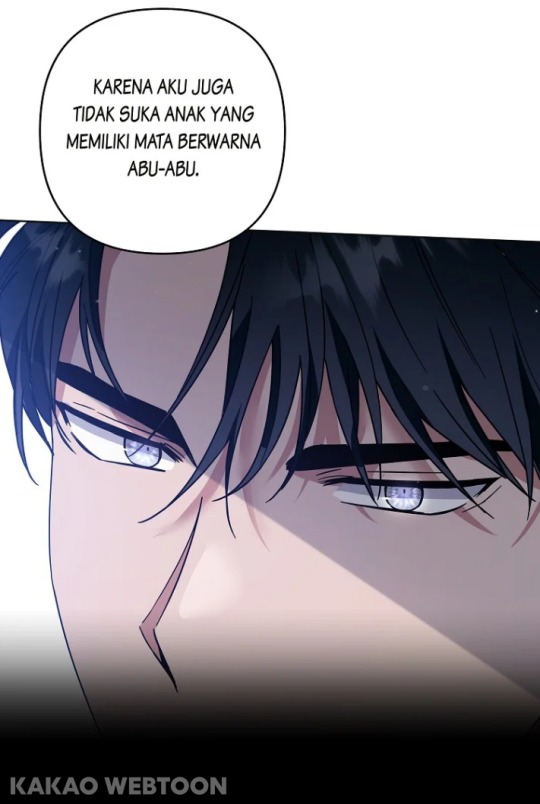
It's always "Oh, Winter is so bad" , "Why he is so insecure, he's rich! His life is better now why he still think of his past!" , "Winter is so cruel to other person except Violet" etc etc, but never "He become cruel like that because it's his defend mechanism. For him, being seen as intimidating is better than being seen as weak and get oppressed because of that."
If that's not a product of racism, I don't know what it is.
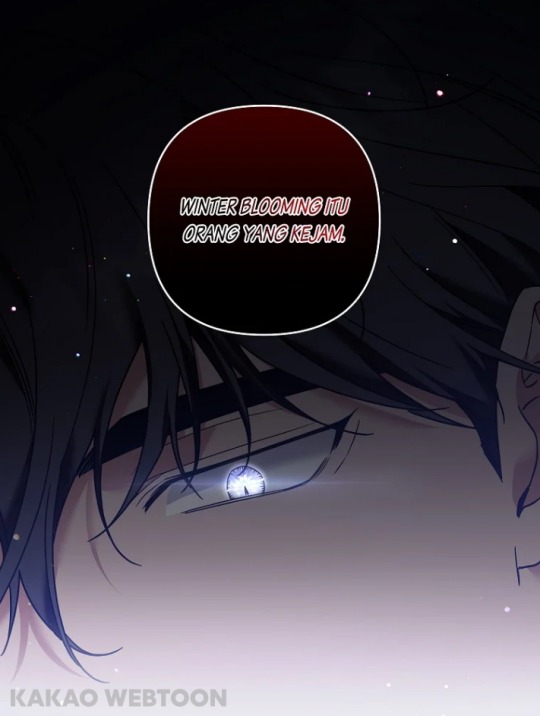
There's no winning in this situation, man. I think I just hit myself with a massive brick. This is what happen when rofan author decided to put a little bit too much realism in their works. It's a great portrayal though. It just that... not everyone get it at first reading.
"So you want us to reread WIMTBY? Are you insane?"
Yes. I know I sound crazy when I say WIMTBY is my comfort read. But really, there's so much to unwrap here that might not seems obvious until some reread. It's not just an angst p000rn when you realized the deeper meanings behind it.
And I don't want to see anyone compare Winter to literal r4p1st like Ruve and Alecto ever again. He never tried to abuse Violet in any way, it's purely miscommunication. His character is a product of racism that resulted in toxic masculinity. He is not close to allat tr4shy men.
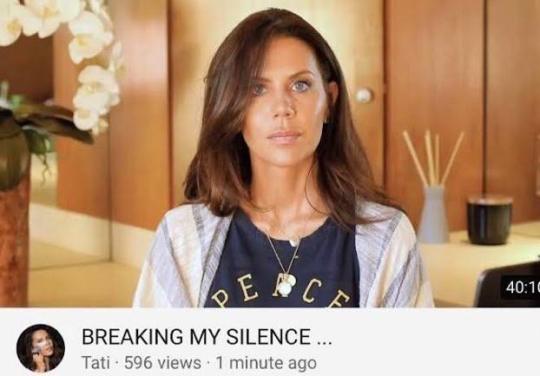
#manhwa#romance fantasy manhwa#historical romance manhwa#josei manhwa#manhwa recommendation#angst#kakaopage#what it means to be you#winter blooming lawrence#violet blooming lawrence#character analysis#i'm so sick#anyway expect me to tweet more rofan manhwa like this because I think my fixation towards them is back#if this WIMTBY manhwa didn't have a fandom I'll make one myself
17 notes
·
View notes
Text



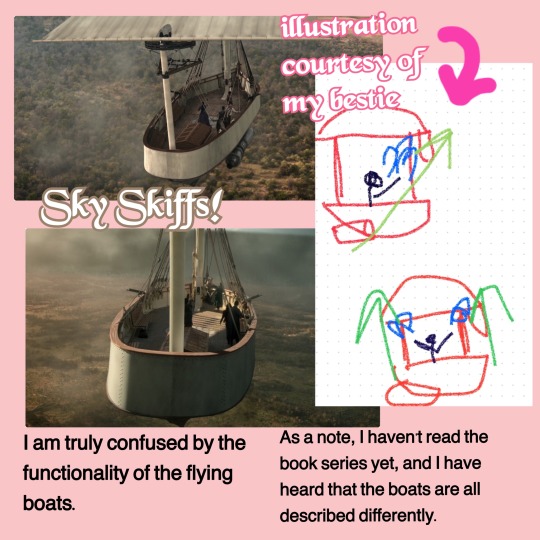

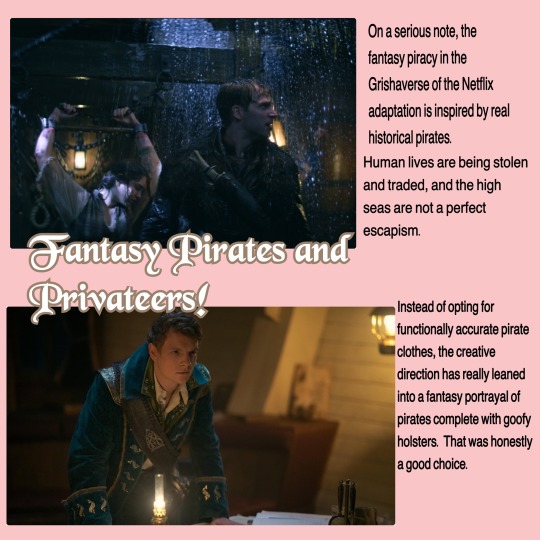

Cultural Maritime and Shadow and Bone
Having finished the second season of Shadow and Bones, I finally put together some notes on the fantasy maritime in the Netflix adaptation of the Grishaverse. Noting that I haven't myself read the book series yet; having seen the use of land, air, and sea vessels, I'm excited to read!
Check out the book series by @/lbardugo (on instagram) if you're interested as well. I hope to do a book review for both the trilogy and the duology soon.
Also, check out this text if you can:
The Culture of Ships and Maritime Narratives (British School at Athens - Modern Greek and Byzantine Studies)
~ Author: Papadopoulou, Chryssanthi
#shadow and bone#leigh bargudo#ya fantasy books#ya fantasy romance#ya fantasy#cultural maritime#fantasy maritime#pirate fantasy#fantasy pirates#fantasy piracy#historical fantasy#fantasy privateers#film review#film analysis#book analysis
10 notes
·
View notes
Text
when i was a kid i really resented the fact that my mom kept forcing us to check out nonfiction books alongside our fantasy novels in order to "broaden our minds" and basically ensure we were learning Real Factsies(tm), but now that i'm older, if i don't go off and learn some Real Factsies(tm) every so often, then i'll end up finding my fictions dull and uninspired
#i guess i just also hated how kids' nonfiction tended to present itself. unless they were like those slim encyclopedias#with all the sleek pictures n glossy pages of diagrams n shit#bc i remember reading a nonfiction book abt seahorses for adults called 'poseidon's steed' in like fifth grade and loving it#adult nonfiction books (in my limited experience) tends to read more like storytelling except everything is real and has citations#also now that i'm an Adult(tm) with More Life Experience(tm)(tm) (this is a cue for my older mutuals to laugh at my precociousness or w/e)#i find it easier to connect to the text-- in this case a book abt a guy called paul otlet n his contributions to information science#which is a thing i am Very Much interested in bc the internet has spoiled me with its indexing and yet i love analog information#also it was right next to two volumes from the 60s detailing various historical book burnings#and indeed the intro talked abt how this man's life's work was handily destroyed by the nazis who thought he was cataloguing garbage#learning abt all the lil guys in the 20th century who fuckin loved organizing information n bitched abt there being information overload#they are So Real they would have looked at the modern internet n gone 'this is too much make wikipedia the main page'#花話#anyway i doubt i'd have appreciated reading so much had i not read fiction so avidly growing up#and i rebuke the idea that the fantasy novels taught me nothing at all bc stories teach us abt being people#and demonstrate experience better than a more academic n factual analysis/write-up or w/e#yes i do love to learn abt philosophy in its like. rigorous academic state or form or w/e.#but that's diff from seeing it in practice in the real world or in people's stories n how it Affects Things
7 notes
·
View notes
Text
Bridgerton: A Diverse Fantasy or a Distorted Memory?
“Bridgerton” has captured the hearts and imaginations of viewers around the world with its sumptuous visuals, compelling storylines, and groundbreaking diverse casting. Created by Chris Van Dusen and produced by Shonda Rhimes, this period drama has been lauded for showcasing Black, brown, and Asian actors in roles traditionally reserved for white actors in Regency-era settings. As a celebration…
#Bridgerton#British aristocracy#Chris Van Dusen#colonialism#critical reflection#diverse casting#escapism#fantasy vs. reality#historical accuracy#Historical Context#historical injustice#inclusive narratives#opulence#people of color#period drama#racial diversity#racial power dynamics#Regency era#Representation#romanticized history#screen representation#Shonda Rhimes#Slavery#TV series analysis#wealth and privilege
0 notes
Text
Providing a deep analysis of all Studio Ghibli films would be an extensive undertaking, considering the studio's rich and diverse catalog. However, I can highlight key themes and elements that are often present in their films.
1. **Spirited Away (2001):** Explores identity, environmentalism, and the spirit world. The bathhouse setting is a metaphor for societal structures.
2. **My Neighbor Totoro (1988):** Focuses on the innocence of childhood, the connection to nature, and the acceptance of mystery.
3. **Princess Mononoke (1997):** Tackles environmentalism, the clash between industrialization and nature, and the complexity of human relationships with the environment.
4. **Howl's Moving Castle (2004):** Examines themes of war, love, and transformation, set against a backdrop of magical realism.
5. **Grave of the Fireflies (1988):** A powerful anti-war film exploring the impact of conflict on two siblings during World War II.
6. **Kiki's Delivery Service (1989):** Focuses on self-discovery, independence, and the challenges of growing up.
7. **The Wind Rises (2013):** Tells the story of an aeronautical engineer against the backdrop of historical events, reflecting on creativity, passion, and the moral implications of invention.
8. **Porco Rosso (1992):** Explores themes of identity, war, and redemption through the tale of a World War I flying ace transformed into a pig.
9. **Castle in the Sky (1986):** Features an adventurous tale with themes of environmentalism and the consequences of human greed.
10. **Whisper of the Heart (1995):** Focuses on adolescence, dreams, and self-discovery, emphasizing the importance of pursuing one's passions.
These brief insights into a selection of Studio Ghibli films highlight their exploration of diverse themes, including environmentalism, identity, and the human connection with nature. Each film is a unique artistic expression that often combines fantasy with deep, thought-provoking narratives.
#studio ghibli#hayao miyazaki#spirited away#my neighbor totoro#princess mononoke#howl’s moving castle#grave of the fireflies#kiki's delivery service#the wind rises#porco rosso#castle in the sky#whisper of the heart#chatgpt#film#film analysis#film theory
2K notes
·
View notes
Text
hot take: the Avatar state (in its form through Aang) is very clearly a representation of the Great Equalizer (atom bomb) and getting rid of its absolute power was actually a good thing narratively, you guys just like the power fantasy/nostalgia too much.
like, he quite literally becomes an atom

“come on out little boy”
Little Boy was the name given to the bomb dropped on Hiroshima. the Fire Nation mirrors Imperial Japan. “No, I’m not gonna end it like this…”
“Now I am become death, destroyer of worlds” is a line Oppenheimer took from the Bhagavad Gita, a sacred text in Hinduism about the reincarnation of Vishnu, which is what the concept of the Avatar is based upon.
literally begging you guys to engage with analysis of the writing in atla through a historical context 😭
#atla#avatar the last airbender#aang#legend of korra#the legend of korra#lok#tlok#korra#atla meta#atla analysis#atla aang#aang meta#avatar aang#oppenheimer
397 notes
·
View notes
Text
World Map Notes: the Elven Northern & Southern Central Continents
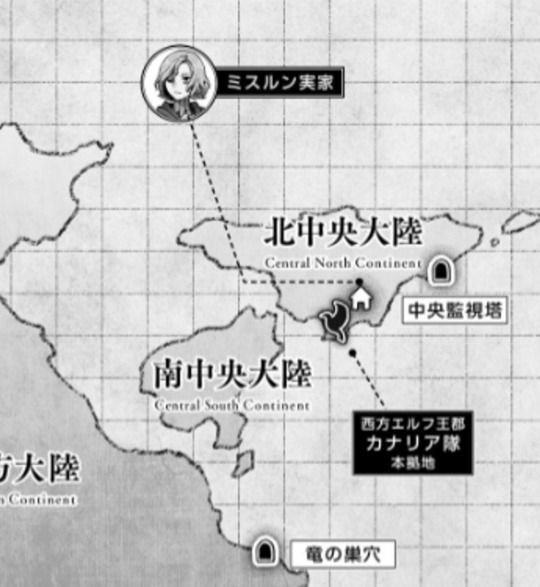
These nations are where all the elves in the story except Marcille and Thistle are from. This post collects all the information I could find about these two nations, and included a bit of analysis based on that information.
TL;DR (includes both fact and my speculation):
The Northern Central Continent is a feudal monarchy with a strong class system, as well as strict borders, & could probably be considered an ethnostate. It's deeply hierarchical, and the queen is a traditionalist - so it's probably very structurally biased against non-elves and half-elves.
Elves in the NCC practice cannibalism in some rural areas!
The Southern Central Continent is more diverse, with a large tallman population on its South Coast.
To elves, "Court Magicians" exclusively refer to those serving the elven queen - a prestigious role that seems likely to be only open to nobles.
The SCC may not be a monarchy, though it's not clear what kind of leadership or societal structure it does have.
The NCC will habitually take anyone involved in ancient magic as a criminal to prosecute on their terms, regardless of jurisdiction, but this depends on their political influence and ability to pressure local leaders to agree to extradite the criminal.
Elves VS Dwarves and Gnomes may have been at war around the time of the Golden Kingdom being sealed. This conflict also may be one of the factors pushing the kingdom to be sealed in the first place.
The "Central Region" might be the origin of the "Common Tongue" that our characters speak.
Northern Central Continent
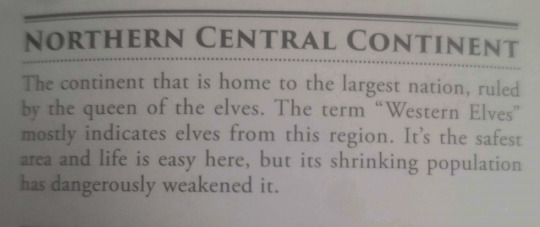
The Adventurer's Bible | p. 132
For this place to have a high quality of life, and also a declining population - especially when it's so close to the Western Continent, which is stated to have poor quality of life - there must be strictly maintained borders and a strong anti-immigration policy. Based on the attitude of the elves, I wouldn't be surprised if it was very difficult to move there unless you are also an elf.
It could probably be considered an ethnostate - and while in these kinds of fantasy worlds, that's pretty common. Take Rivendell, or Moria, in LOTR - they take for granted that these kinds of different fantasy races will live in separate communities.
But that isn't actually realistic, and I think Kui has considered it as more of a politically established status quo rather than an obvious natural result of having magically distinct "races". Which, even in Dunmeshi, I think is a difficult and not-terribly-accurate way to represent politics - racism does not emerge from actual, physical differences between races, after all.
But Dunmeshi's presentation of this idea is interesting, because of the recognition that if there is an "elven nation" which prioritises the interests and rights of elves over other races, that is because there's a deliberate, concerted effort to keep it that way.
But there's a small section of the NCC with a high tallman population - I wonder what kind of community they have, and how they fit into the strict elven hierarchy?
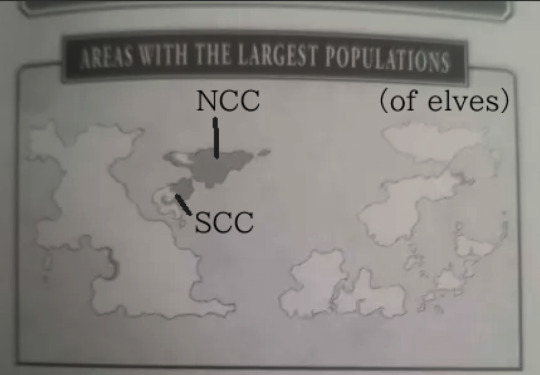

The Adventurer's Bible | pp. 134 & 136
Kabru and Rin, and other kids like them, who are adopted or taken as adopted children(rarely - the way Milsiril treats Kabru is not perfect, but she's deliberately attempting to be better than other elves.... meaning other elves are usually worse)/pets/objects by elven nobles, as well as accomplished or notable individuals who earn the elves' favour/are "invited" to stay (such as they try with Laios at the end of the story) would be an exception.
Other long-lived races could probably (...?) visit, but given the historical conflict between elves, dwarves, and gnomes, I think they'd also be pretty hostile to many of them coming to live on the NCC, even if they see them as more like equals.
Social Structure & Nobility
The Northern Central Continent is an absolute monarchy under a 372 year old queen, Heimeya (IDK what the official romanisation of her name will be).
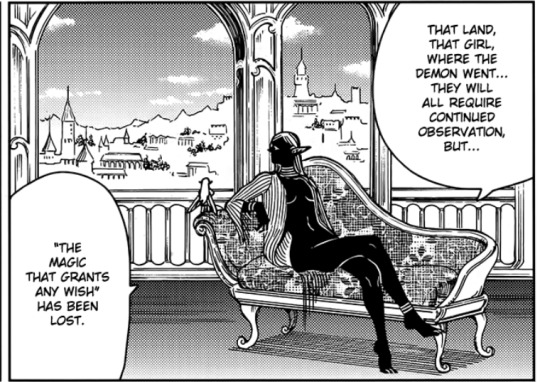
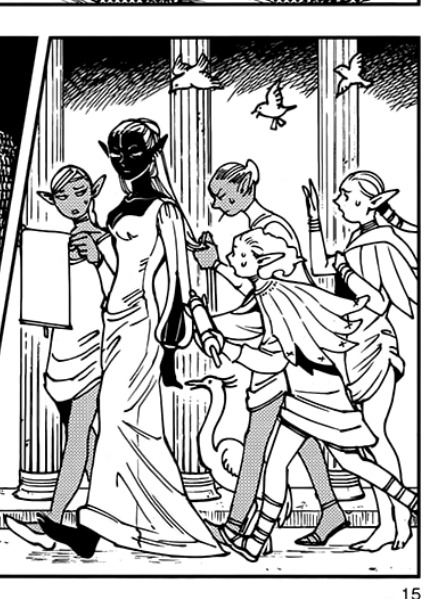
...With extended "nobility", which are the group that the canaries' guards draw from. We don't get much clarification of what sort of structure their nobility has, what titles there are, and where our characters who are nobles fall into it.
Pattadol (House of Vari), Mithrun (House of Kerensil), and Milsiril (House of Tol) are nobles.
Mithrun's noble house, Kerensil, is apparently a well-known family of investors! I wonder what sorts of businesses they invest in & what the elven economy is like?
Milsiril's house, on the other hand, is a well-known military family. I wonder if Kabru could claim the surname "of the House of Tol". He did go to family gatherings after all. But if he was comfortable doing so and it would be accepted, I would assume he'd have done so when introducing himself to the canaries.
Flamela is a distant relative of the queen, who has additional status due to exhibiting the genetic trait associated with their queens, extremely dark skin.
The queen is a "staunch traditionalist" who wouldn't even acknowledge a half-elf like Marcille. Nice! I really feel bad for Kabru and Rin growing up as tallmen in this sort of culture.
Court Magicians
While generally this is a term for any magic user who serves in a royal court, in the Northern Central Continent it seems to carry a lot of esteem; even just as the daughter of one, Pattadol assumes Marcille has the right to boss her around and to handle highly secret, highly illegal ancient magic secrets.
That makes sense, as in the society of the Northern Central Continent, you'd be directly serving the elven queen. But also, she has enough Court Magicians that Pattadol would not expect to know Marcille's mother's name, but few enough that it would be a big deal and Cithis would know about it if one had a half-elf child.
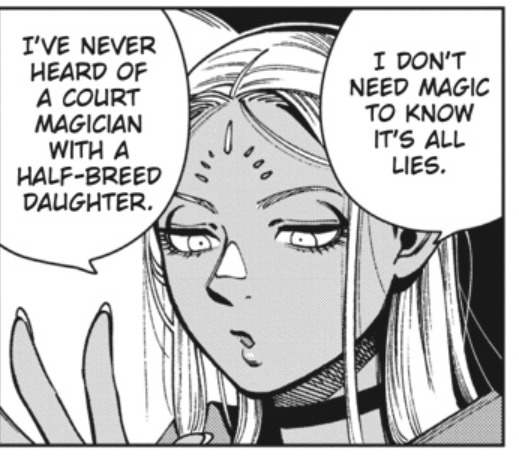
I don't think it's remotely unlikely based on that to assume that this role is only available to nobles.
A "Court Magician" who doesn't serve the NCC Queen isn't a "real" Court Magician in the eyes of NCC elves. Those short-lived monarchs would be happy just to have an elf around regardless of whether they were actually any good at magic.... according to Cithis.
Magic seems very important to the society of the NCC elves. The queen communicates with her subordinates via familar, and the birds we see surrounding her seem like they are some kind of magic - perhaps not familiars since we see her familiar, but some other kind of scrying?
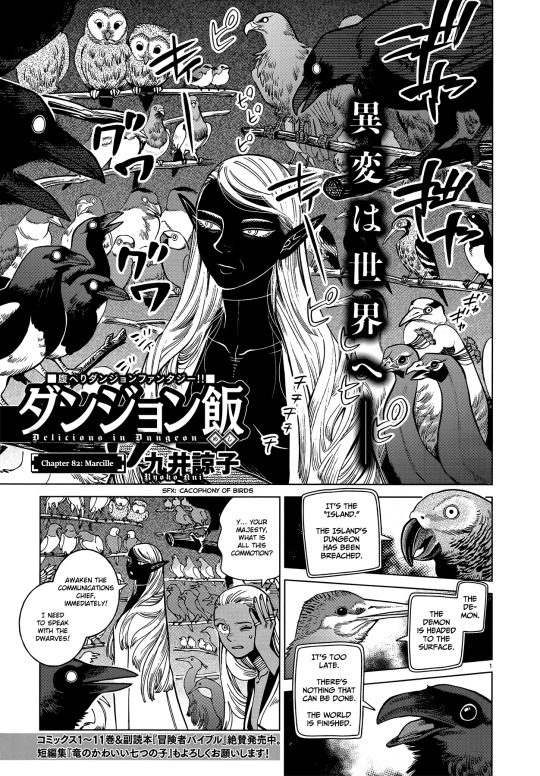
Also, based on the fact Pattadol assumes a Court Magician would be serving the Queen of the NCC, we can theorise that perhaps whatever structure the SCC has, it isn't a monarchy....? Heimeya is "the queen of the elves", after all - that doesn't sound like there's another elven monarch competing for the title just next door.
Ordinary People
Apparently the NCC is a safe place and life is easy -- but given the strict class system, I kind of expect that varies a lot depending on the family you're born into.
The only elves we meet who are not nobles are the convicted criminal canaries, so it's hard to get a sense of what life is like for them from that. Cithis was apparently a wealthy fortune teller with "an intense jealousy for those born noble or wealthy." So I assume she was not born into comfort.
Apparently "There are also primitive villages deep in the woods and underground, and in some regions cannibalism is still practiced." Which is awesome. Based on her videogame elves art I think Kui's probably making a little nod to Divinity: Original Sin elves, who can absorb memories through eating the flesh of others. Elves in dungeon meshi don't have this trait, but I wonder if there is a magical ritual or some kind of cultural practice with a similar intention.
Cuisine
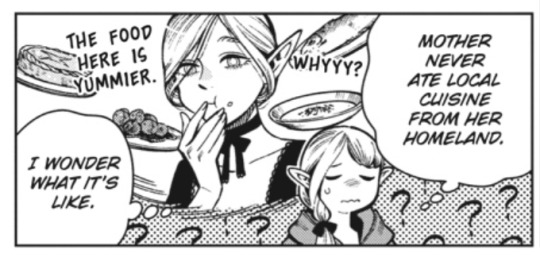
Marcille's mother didn't think much of the elven cuisine.
Liricmumwarel is fancy candy given out by the elven queen the shape of which conveys blessings.
Elf Cake is a crumbly dry cake that Kabru and Thistle don't think much of. I've heard someone discuss what it's likely to be made of, but I am afraid I don't recall.
Southern Central Continent
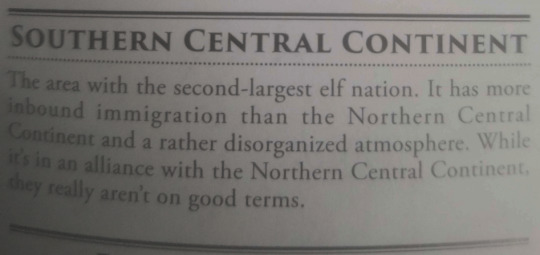
The Adventurer's Bible | p. 132
It seems like the Southern Central Continent gets a lot more immigration and has a more diverse population, especially along the south coast (near the Western Continent). That south coast has a high tallman population.
Fleki and Lycion are from the Southern Central Continent. Fleki got into ancient magic for the money, so you can assume there's probably class disparity there too; things are noted by Kui to be more "disorganised" than the NCC. Not a bad thing at all - the NCC is definitely too "organised" in my books. But that does potentially also mean there's less, e.g., bureaucracy, central organisation, less of a social safety net. But then again, in the NCC I doubt that whatever "safety net" there is, is available to everyone.
We can't extrapolate much from Fleki & Lycion's personalities, because they clearly aren't in the most stable societal position, and I get the sense that they're the countercultural type - they probably don't represent the type of person typical to the SCC. Also, our NCC characters are all either nobles or used to navigating high society (Cithis, Kabru to an extent) so they aren't exactly a typical "ordinary NCC person" as a basis for comparison either. However, there's less of a "strict set of social rules" type of feel to the SCC characters, fitting with my suggestion that the SCC may not be a society with a strong feudal element.
Geopolitics & Conflict
The fact that, despite their being from the SCC, Fleki and Lycion are in the Canaries, who work directly under the NCC's Queen, implies that the the NCC feel entitled to process and prosecute people who commit ancient magic-related crimes regardless of any notion of "jurisdiction". This is backed up by the way that they were going to take Marcille - but that is something that the governor of the Island had to give permission for, which Laios is able to withdraw. So I assume that the NCC elves apply pressure on various world leaders to extradite criminals involved in ancient magic.
The SCC would cooperate with this, since they're allies, even if they don't have a great relationship (according to the World Guide).
The NCC are also clearly able to take half-foots without trouble, as we see by Chilchuck saying he's known half-foots who got involved with "black magic" (ancient magic) and were disappeared by the elves. But I doubt gnomes or dwarves are giving people up easily - though that probably doesn't go for dwarves like Senshi and Namari, without strong community ties.
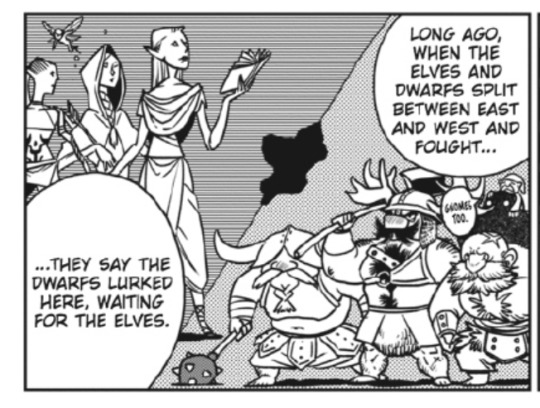
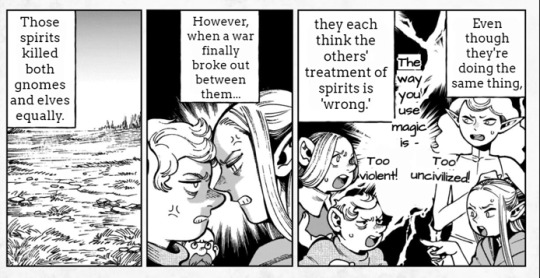
Long before the current times, elves fought dwarves & gnomes. There might have been more than one of these conflicts...? While long ago, this war isn't "ancient" (like the ancients who sealed the demon into dungeons, before their world was mostly destroyed by it).
Thistle, Delgal, and the Golden Kingdom were (I believe) caught up in one of these conflicts, which used Melini as a staging ground - thus why Thistle was pushed to seal the entire kingdom in the dungeon.
To do this, Thistle unseals a dungeon created by the "ancient people". These could be the "ancients" who created the dungeons, before the apocalypse. Or they could be another, still extinct, society.
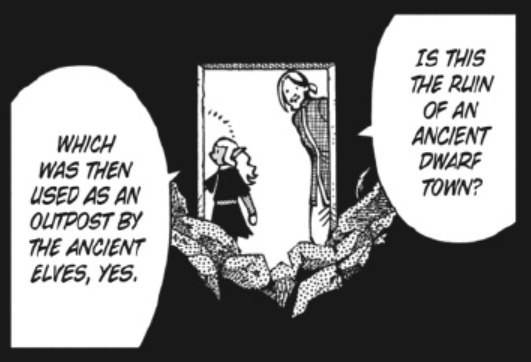
Regardless, at least one of these conflicts seems to have taken place after the golden kingdom was sealed - so, within the last 1000 years.
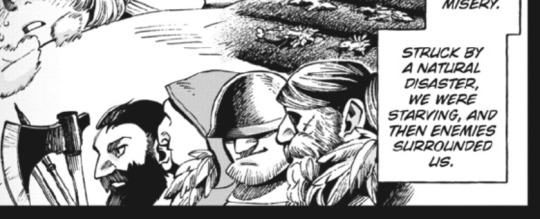
Though, this could refer to a different, more localised conflict between the Golden Kingdom and their dwarven neighbours.
The order of events is that the Golden Kingdom was sealed (1000 years ago or so) > Dwarves took over > Elves stole the land from the Dwarves ("long ago" by the Island Lord, a tallman's, standards) > Elves gave the land to a local lord, who was either an ancestor of the Island Lord, or the Island Lord himself. The Island Lord is himself a descendant of the lord who poisoned Delgal's father, as is noted in the World Guide. However, it isn't impossible for there to be large gaps of time between these events, which could put the elf / dwarf wars at a more recent date.
The fact we know that the elves stole the land from the dwarves, and then granted it to a political actor who was relevant during the events of the Golden Kingdom flashbacks we see suggests to me that the events were roughly contemporaneous. If they were, that puts at least one of these conflicts at roughly 1000 years ago.
So, the elf/dwarf & gnome conflict is "long ago" by short-lived standards, but would be considered "modern" by the long-lived races, if you ask me. At least, the equivalent of the World Wars for us - recent history, even if we weren't alive.
I'm guessing the "Elf King" from the below panel in fact was a word that's more gender-neutral in Japanese, since the "Western Elves" definitely have a queen.
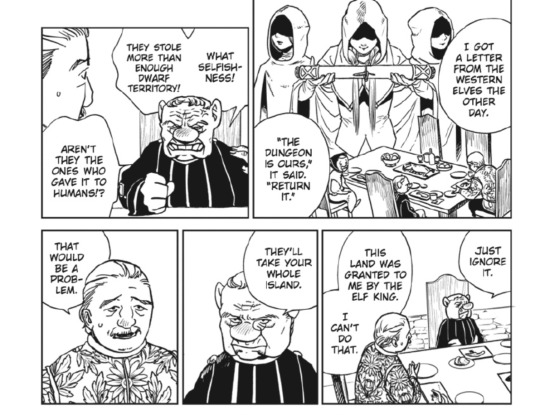
Language
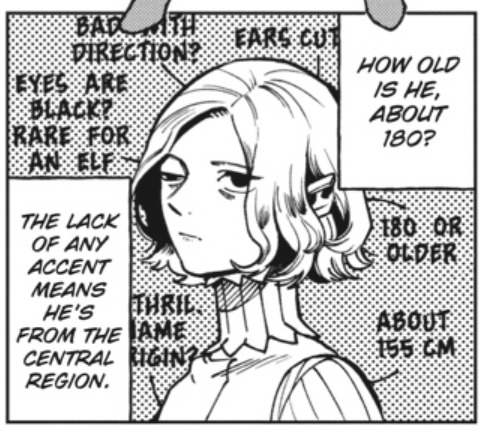
When Kabru says the "Central region" I expect he means the region where the NCC and SCC is.
The fact that he observes that the lack of any accent means he's from the Central Region is really interesting. It could mean two things;
either they switched to speaking in the language spoken on those continents, which Kabru would naturally know, having grown up there. It's 100 percent possible, but I think this would be noted in the story.
or, the language that gets called "the common tongue", the one that all our principle characters speak for most of the story, originated from the elves in the Central Continent. Or at least it's the same one that the elves use, and their political influence is great enough that their accent gets to be considered not an accent at all. The fact they were "granting" land in this area to tall-man lords suggests a large enough historical influence in the area that this is quite plausible to me.
Mithrun absolutely does have an accent - nobody speaks without an accent. His accent is just politically and socioculturally normalised to the point of being considered the "default/proper" way to speak - like received pronounciation in English.
The common tongue isn't ubiquitous everywhere - not just Kuro, but Kiki and Kaka are also noted to be studying the common tongue. The Tansus were born on the Eastern Continent, so probably gnome communities there speak their own language - Kiki and Kaka grew up primarily surrounded by gnomes after all.
It's also quite likely that Kabru, specifically, because of where he grew up, would consider Mithrun's way of talking to be the default "not an accent" accent. His adoptive mother surely has the same upper-class NCC accent. I expect that other characters might experience it as more "marked".
This isn't a world where everyone speaks the same language everywhere; the common tongue is called that, but there are many different languages. Kabru and Chilchuck are two characters who are adept with many of them - Kabru speaks the language of the kobold, and probably lots more. Chilchuck works as an interpreter as part of his union stuff - I can tell you from experience that that's a hugely valuable skillset in that context, as many of the people who most need union representation are people who don't speak the dominant language, or at least not fluently.
If you got all the way to the end of this post.... thank you for reading, I love you. Check out my other World Map Notes under that tag on my blog; I've made a few so far and there will almost certainly be more. Next I'm thinking the dwarven nations...? But I could be persuaded if someone had a preference.
Also, anyone got any speculation on what, exactly, is the previous time that Heimeya ate a person/monster/chimera that this panel implies:

We really don't have anything to go on whatsoever, but I think it's a fun tidbit.
#og post#dungeon meshi manga spoilers#dungeon meshi meta#dunmeshi#dungeon meshi analysis#delicious in dungeon spoilers#dunmeshi spoilers#delicious in dungeon#dunmeshi meta#the canaries#milsiril#mithrun#kabru of utaya#i feel sooooooo sane to have made this. but it has some super interesting details imo#colour coding only on the TLDR just cause I dont want ppl to take my theories as fact#character info I drop without a panel comes from the world bible#world map notes
354 notes
·
View notes
Note
Hi, genuine good faith question if you'd like! How is TOS racist? It was my understanding that the OG Series was like, huge for equality in media?
I’m speaking primarily about the content of TOS itself, not its historical impact - I understand it had various historic firsts in terms of having characters of colour in respectable roles, which I’m not dismissing. My experience with the discourse on here surrounding the show is that people front-load these character representations as emblematic of the show’s progressive politics. Which, if we want to go that route, TOS was contemporary to the US civil rights movement, which provides us with a handy measuring stick to see how TOS actually grapples with race, not just the presence of characters of colour themselves. I'm going to be kind of defensive in this explanation, not towards you specifically, but because I have had this conversation with people online many, many, many times, and so any defensiveness on my part is in anticipation of arguments I know will come up as a result of making the basic claim that a show made in America in the 1960s is racist. I'm also going to be copy + pasting from an older post I've made on the subject since it's been a while now since I've watched TOS so some of the details are fuzzy.
Like okay, the premise of TOS is that the Enterprise, as an ambassador of Starfleet/the Federation, is seeking out new alien life to study. The Prime Directive prohibits the Enterprise crew from interfering with the development of any alien culture or people while they do this, so the research they collect needs to be done in an unobtrusive way. I think this is the first point at which people balk at the argument that TOS is racist or has a colonial conception of the world - the Enterprise’s mission is premised on non-interference, and I think when people hear ‘colonial’ as a descriptor they (understandably, obviously) assume it is describing active conquest, genocide, and dispossession. Even setting aside all the times where Kirk does directly interfere with the “development” of a people or culture (usually because they’ve “stagnated” culturally, because a culture "without conflict" cannot evolve or “develop” beyond its current presumed capacity - he is pretty explicitly imposing his own values onto another culture in order to force them to change in a particular way), or the times when the Enterprise is actually looking to extract resources from a given planet or people, I’m not exactly making this claim, or rather, that’s not the only thing I’m describing when calling TOS racist/colonial.
The show's presentation of scientific discovery and inquiry is anthropological - the “object” of analysis is alien/foreign culture, meaning that when the Enterprise crew comes into contact with a new being or person, this person is always read first and foremost through the level of (the Enterprise’s understanding of) culture. Their behaviour, beliefs, dress, way of speaking, appearance, and so on are always reflective of their culture as a whole, and more importantly, that their racial or phenotypic characteristics define the boundaries of their culture. Put another way, culture is interpreted, navigated, and bound racially - the show presents aliens as a Species, but these species are racially homogeneous, flattening race to a natural, biological difference that is always physically apparent and presented through the lens of scientific objectivity, as "species" is a unit of biological taxonomy. Basically species is a shorthand for race. This is the standard of most sci-fi/fantasy genre work, so this is not a sin unique to Star Trek.
Because of this however, Kirk and Co are never really interacting with individuals, they are interacting with components of a (foreign, exotic, fundamentally different) culture, the same way we understand that a biologist can generalize about a species using the example of an individual 'specimen'. And when the Enterprise interacts with these cultures, they very frequently measure them using a universalized scale of development - they have a teleological (which is to say, evolutionary) view of culture, ie, that all cultures go from savage to rational, primitive to advanced, economically simple to economically complex (ie, to capitalist modes of production). And the metrics they are judging these cultures by are fundamentally Western ones, always emphasising to the audience that the final destination of all cultures (that are worthy of advancing beyond their current limited/“primitive” stages) is a culture identical to the Federation, a culture that can itself engage in this anthropological mission to catalogue all life as fitting within a universal set of practices and racial similarities they call “culture.”
This is a western, colonial understanding of culture - racially and spatially homogeneous people comprise the organs of a social totality, ie, a society, which can then be analysed as an “object,” as a “phenomenon,” by the scientists in order to extract information from them to produce and advance state (ie Federation) knowledge. The Enterprise crew are allowed to be individuals, are allowed to be subjects with a capacity for reason, contradiction, emotion, compassion, and even moments of savagery or violence, without those things being assigned to their “race” or “culture” as a whole, but the people they interact with are only components of a whole which are “discovered” by the Enterprise as opportunities to expand and refine the Federation’s body of knowledge.
Spock is actually a good example of what I'm talking about, because he is an exception to this rule - unlike the others in the crew, his behaviour is always read as a symptom of his innate Vulcan-ness, where his human and Vulcan halves war for dominance in his mind and character. Bones (the doctor, one of the main cast) constantly comments on Spock's inability to feel things, that he is callous and unsympathetic, ruled by Vulcan logic to such an extreme that his rationality is a form of irrationality, as his Vulcan blood prohibits him from tempering logic with human emotion and intuition. Now you can argue that Bones is a stand-in for the racists of the world, that Spock proves Bones wrong in that he is able to feel but merely keeps it under wraps, that Vulcans are not biologically incapable of emotion but merely live in a socially repressive culture, but this still engages in the racial logic of the show - Vulcans are a racially-bound species with a single monolithic culture, and Spock's ability to express and feel 'human emotions' is the metric by which he is granted human subjectivity and sympathy.
And on the flip side you have the Klingons - a “race” that is uniformly savage, backward, violent, and dangerous. In the episode Day of the Dove, where Klingons board the Enterprise along with an alien cloud that makes everyone suddenly aggressive and racist (this show is insane lol), the Enterprise crew begins acting violent and racist, but the Klingons don’t change. They aren’t more violent than before (because they already were fundamentally violent and racist), and they don’t become less violent when the cloud eventually leaves (because they are never able to emerge from their violence and savagery as a social condition or external imposition - they simply are that way). Klingons are racially, behaviourally, psychologically, and culturally homogeneous, universally violent and immune to reason, and their racial characteristics are both physical manifestations of this universal violence as well as the origin of it. The writers and creators of TOS are explicitly invoking the orientalist idea of the “Mongolian horde,” representing both the American fear of Soviet global takeover as well as blatantly racist fears about “Asiatics” (a word used in the show, particularly in The Omega Glory where a fear of racialised communist takeover is made explicit) dominating the world.
This is colonial thinking! Like, fundamentally, at its core, this is colonial white supremacist thinking. Now this is not because TOS invents these tropes or is the origin of them, it is not individually responsible for these racial and colonial logics - these conceptions are endemic to Western thought, and I am not expecting a television show to navigate its way outside of this current colonial paradigm of scientific knowledge. I’m also not expecting an average person watching this to pick out all the intricacies of this and link it to the colonial history of Europe or the colonial history of western philosophy/thought. But this base premise of Star Trek is why the show is fundamentally colonial - even if it was the case that the crew never intervened in any alien conflict, never extracted any material resources from other people, this would still be colonial logic and colonial thinking. The show has a fundamentally colonial imagination when it comes to exploration, discovery, and culture.
I think a good place to end is the opening sequence. The show's first line is always "Space! The final frontier." I do not think the word frontier is meant metaphorically or poetically - I think the show is being honest about its conception of space as an infinitely vast, infinitely exotic frontier from which a globally Western civilisation (which the Enterprise is an emblem of) can extract resources, be they material or epistemic
262 notes
·
View notes
Text
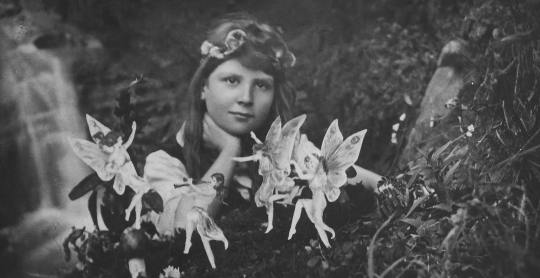
The Cottingley Fairies story is one of the most fascinating tales of deception in the 20th century, capturing the imagination of the public and even fooling some of the greatest minds of the time. What began as an innocent prank by two young girls in Yorkshire, England, grew into a phenomenon that blurred the lines between fantasy and reality, challenging people's willingness to believe in the extraordinary.
In the summer of 1917, 16-year-old Elsie Wright and her 9-year-old cousin Frances Griffiths lived in the village of Cottingley, near Bradford. Like many children, they were enchanted by the idea of fairies, inspired by the lush surroundings of the Cottingley Beck, a small stream near their home. Using Elsie's father's camera, the girls took a series of photographs that appeared to show them interacting with delicate, winged fairies. The first photograph depicted Frances with several small fairies dancing in front of her, while another showed Elsie sitting with a gnome.
The photographs were meant to be a playful trick, a way to amuse themselves and their families. Elsie had drawn the fairies on paper, cut them out, and used hatpins to secure them in the ground before posing with them. To the girls' surprise, the images turned out convincingly lifelike, and their parents, especially Elsie's father, were skeptical but intrigued.
The Cottingley Fairies might have remained a private family joke if not for the involvement of Sir Arthur Conan Doyle, the famous author of the Sherlock Holmes stories. Conan Doyle was a devout Spiritualist, deeply interested in the supernatural and the possibility of life beyond the physical world. In 1920, when the photographs came to his attention through a mutual friend of the Wright family, he was immediately captivated.
Conan Doyle saw the photographs as possible evidence of the existence of fairies, which aligned with his belief in the spiritual world. He wrote an article for The Strand Magazine, enthusiastically presenting the photos as proof of supernatural beings. The article, published in December 1920, included two of the fairy photographs and generated widespread interest and debate. Many people were fascinated by the idea that fairies might be real, while others remained skeptical, questioning the authenticity of the images.
The public's reaction to the Cottingley Fairies was mixed. Some embraced the photographs as genuine evidence of a hidden world, taking comfort in the idea of magical beings inhabiting the natural environment. Others were more critical, pointing out the suspiciously paper-like appearance of the fairies and the potential for trickery. Despite the skepticism, the fairies captivated the popular imagination, particularly in a post-World War I society that yearned for wonder and escapism.
The controversy over the photographs persisted for decades, with many debates centered on whether the images were authentic or a clever hoax. Despite advances in photographic analysis, the fairies' true nature remained elusive, partly because of the credibility that figures like Conan Doyle lent to the story.
It wasn't until the 1980s, more than 60 years after the photographs were taken, that Elsie and Frances finally admitted the truth. In interviews with The Unexplained magazine and in a book titled The Secret of the Cottingley Fairies, the elderly women confessed that the fairies were indeed cardboard cutouts, inspired by illustrations from a children's book. However, they maintained that they really had seen fairies in Cottingley Beck and claimed that one of the five photographs, the final one, was genuine.
Even with this admission, the allure of the Cottingley Fairies story persisted. The photographs had become iconic, not just as a historical curiosity but as a testament to the power of belief and the human desire for magic in the mundane.
147 notes
·
View notes
Note
People who see the dragons as nukes who must die are completely misinterpreting the story. Let’s apply this analysis to the books though. Does Daenerys receive 3 deactivated nukes as a gift in her wedding day ? Does she press a nuke against her pregnant belly and the chemicals inside of it reach out to her unborn child ? Does she lay 3 nukes in her husband’s funeral pyre to honor him ? Does she lovingly hold and breastfeed 3 nukes ? Does Jon Snow wish that he had a nuke to fight off the freezing cold ? Does Arya consider nukes to be her friends ? Does young Tyrion beg his uncles for a nuke so he can be less lonely ?
Dragons aren’t single purpose objects, they’re living, thinking, breathing creatures, and Daenerys specifically views them as such, she literally thinks of them as her children. Historically, the dragons were essentially enslaved by the blood bond and the problem was that they were used by people who viewed them as weapons first and foremost. Daenerys (a character who is extremely invested in liberation by the way) being mother of dragons, specifically, as in giving them life and literally nursing them herself, is meant to show how her relationship to the dragons is unique from her ancestors. They aren’t just a bunch of flying weapons to her.
Dragons are the living embodiment of a primordial natural magical force (fire), and their extinction was caused by misogyny, human ambition, greed, and by people in the story doing exactly what the “dragons are nukes” crowd does, which is look at them as just Big Weapon (e.g. Aemond and Daeron), and said extinction is heavily implied to be the reason winters are getting harsher (“the summers have been shorter since the last dragon died, and the winters longer and crueler”, “the real enemy is the cold”). Calling them nuclear weapons is wayyyy missing the point. It was the greater Valyrian sin of trying to control and dominate nature/magic and bend it to their whims that lead to chaos (hello The Doom and hello Valyria Fanboy Euron), which manifested in the dragon lords like the Targaryens as them controlling dragons, but “dragons are nukes” flattens the theme and misses the forest for the trees, and it’s why you get absolutely mind numbing takes like “yeah George brought back the dragons after centuries of extinction just to kill them all off again after two years in existence because Magic Bad”.
I talked about dragons, their symbolism, etc. HERE.
George at one point did compare dragons to nuclear "deterrents" when he speaks about Dany being the most powerful person in the world in 🔗a Vulture article:
When civilizations clash in your books, instead of Guns, Germs, and Steel, maybe it's more like Dragons, Magic, and Steel (and also Germs). There is magic in my universe, but it's pretty low magic compared to other fantasies. Dragons are the nuclear deterrent, and only Dany has them, which in some ways makes her the most powerful person in the world. But is that sufficient? These are the kind of issues I'm trying to explore. The United States right now has the ability to destroy the world with our nuclear arsenal, but that doesn't mean we can achieve specific geopolitical goals. Power is more subtle than that. You can have the power to destroy, but it doesn't give you the power to reform, or improve, or build.
and GRRM does bring it up to express that dragons are so destructive that one can't use their fire for everything, for every problem when it might spell so much disaster. I think you can use dragons more often if the situation will not spiral out of control--Dragonfire does not persist when one attempts to put it out (like with wildfyre) so its destructiveness is not in the exact same scope or horror as a radioactive nuclear missile that can leave behind radiation/devastation for years afterward...nor does it have the sort of reach these modern weapons have.
Dragonfire remains relatively within tighter confines of its targets unless you got really dry ground and don't put it out in time. The reason why dragonfire is compared to nuclear warfare is because like nuclear weapons now in the real digital-age, modern world, for the world it exists in dragonfire is the most powerful possible weapon of war.
It's about how Dany or anyone uses and regards dragons and others' own conceptions of magic and strength/danger that will make/break how they will perceive dragons. Not that dragons are innately evil; you sound like an overly superstitious and hypocritical Seven septon/over zealous Christian that way.
#asoiaf asks to me#asoiaf dragons#daenerys stormborn#daenerys targaryen#daenerys stormborn's characterization#the evil targaryens#asoiaf articles#defending Daenerys Stormborn Khaleesi Targaryen#asoiaf religion#asoiaf#agot#asoiaf symbolism#asoiaf fire symbolism
60 notes
·
View notes
Text
3-hour-long pokeani video essay topic ideas that I think Hbomberguy or Jenny Nicholson or someone should tackle:

Is The Pokemon Anime Actually Good? A Tale of Fantasy, Fallacy, and Folly (in that order)
Harley's Ass Friday: The Phenomenon That Took Like Maybe 75 People on Tumblr by Storm
A Queer Analysis of Rivalries (Why Are They Like That™?)
A Historical Retelling of Pokeani Ship Wars: 'Like if the Entirety of the Trojan War Took Place on FFN but like Fifteen Times in a Row and People Just Ship Aphrodite, Hera, and Athena Instead Now And It's Called Greekwargoddessshipping or TrojanHorseaShipping or Homer?IBarelyKnowHershipping or Some Shit'
A Psychological Dissertation on Brianna [15 minute side video to queer rivalry video]
Tracey Sketchit's Hate Campaign: What Did he Ever do to You?
Kyle, Kenny, and Todd Snap: The Hate Campaigns We Deserved But Never Got
Team Rocket- The Best Characters or The Epitome of the Flawed Nature of Episodic Repetition? Falling into Pitfalls of Their Own Making Since 1997
#shitpost hours#hey look the pokeani blog is talking about pokeani. it's a miracle#genuinely i could make a real video on the first topic though. lots of genuine thoughts#it basically boils down to 'what you get out of it runs opposite to what you expect of it'#also. the kyle kenny todd one is fully a joke by the way skjfhdskjfhbmdsf#they're objectively fine. well ok kenny has some kennyisms. that one's more debatable but yk#tw eyestrain#<for the caution tape joke banner#pokeani#taylor's tag
56 notes
·
View notes
Text
look. not to be too mean on main. the rightful heir thing. if you don't care about the intricacies of property law or legal writs and just want to focus on characterization and other aspects of storytelling, fine.
but it truly does look very goofy when you start "debating" this while lacking historical context and methodological tools. sometimes a constitutional crisis (that was already resolved in the 12th century and whose results you can always look up) can't just be settled by appealing to one's anachronistic opinion and accusing those who disagree of misogyny.
there's a difference between suggesting how things should be (i.e. prescriptive, i.e. women should never inherit the throne) and analysing how things were for a myriad of socio-political reasons.
also, trust me, the Dance being fictional is not the gotcha people think it is. it's plenty obvious. i'm sorry to say but the premise is so flimsy it would never have happened like that irl.
final idea: likewise, perhaps being condescending about people who do take the time to criticise the premise is veering a little bit towards anti-intellectualism. 'idc about succession laws ergo i'm more enlightened bc i've unlocked an edgelord-y way to enjoy fiction'. a medievalesque fantasy setting is going to attract commentators who are interested in medieval history or at least aspects of it. they may find copy-paste scenarios from real history and think it interesting to compare and contrast. it's not immediately equivalent to treating aegon and rhaenyra like your ballot choices next election, and, equally, they're not discussions without merit.
comparative analysis is a transferable skill! if someone doesn't want to partake, fine, but i think this attitude of turning one's nose at it is a tad coarse. there are many fans who take the time to write informative posts and contextualise this fictionalised universe and it's a shame to automatically write-off what is ultimately a rich tradition in internet asoiaf spaces
#*people with history degrees facepalming their way through the fandom*#everyone has a pet peeve and this is mine#my other controversial opinion is that it's also silly to say it doesn't matter from a storytelling perspective as well#if your intrigue is shaky then it brings the quality of the overall story down#one principle of writing is that your world needs to have consistent internal rules no?#if these rules flip-flop from one situation to the next then that would be a flaw in the worldbuilding#and one thing about grrm's dance is that the intrigue is one of the weak points#succession for the iron throne
127 notes
·
View notes